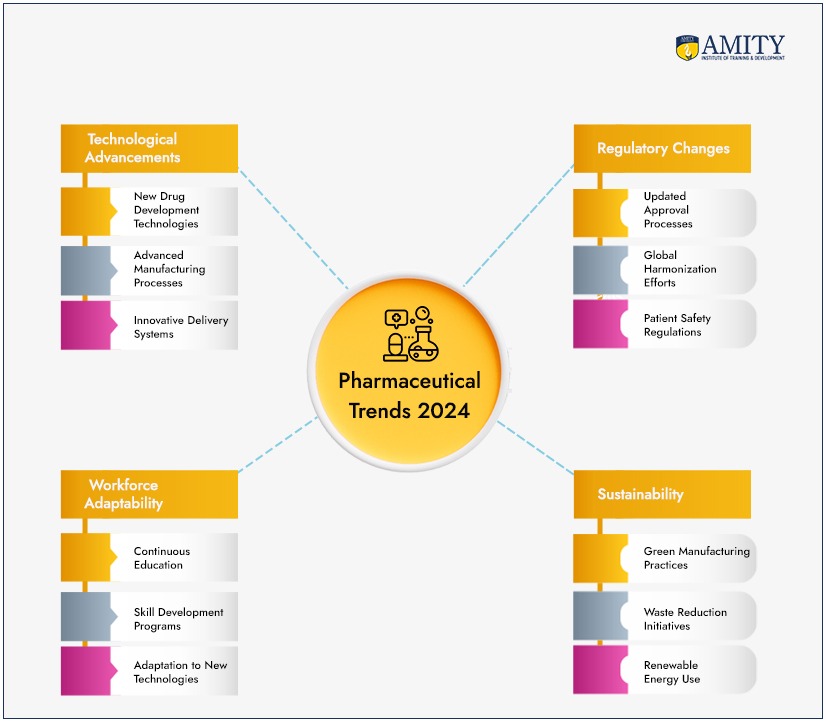Tech-Driven Solutions

Never at standstill, the pharmaceutical industry promises yet another exciting future in 2024 with the widespread emergence of trends that will certainly shape the healthcare systems of the future. Novelty in the sector is, above all, a reflection of technological advancements, regulatory changes, and new interests in sustainability. Innovations reformulate the way medicines are developed, made, and dispatched. Together with these innovations, it is very much needed to have a skilled workforce that is adaptable in response to change. This article summarizes the most important pharmaceutical trends for 2024, including necessary training for professionals to remain competitive.

Did You Know?
The pharmaceutical industry is and remains one of the most innovative sectors in the world. Companies continue to invest millions of dollars into their research and development (R&D) toward taking new medicines to the market.
Transformation in the pharmaceutical industry is set to begin as we enter a new year in 2024. This is more than just the introduction and availability of medicines into the market but also touches on workforce needs. Here are some of the current trends in the pharmaceutical industry that transform its future:
Key Trends in the Pharmaceutical Industry 2024:
1. Artificial Intelligence (AI) and Machine Learning (ML):
AI and ML are modernizing drug development and discovery as they filter large volumes of data to predict a patient’s response, identify potential drug candidates, and streamline clinical trials.
2. Personalized Drugs:
The breakthroughs of genomics and biotechnology could actually breed tailoring therapies according to the individual genetic profiles and become more targeted and fewer adverse effects treatments.
3. Sustainable Manufacturing Practices:
Biopharmas and pharmaceutical companies are instead going for green technologies and sustainability practices that ensure to reduce the carbon footprint and become more efficient resource-wise.
4. Digital Health and Telemedicine:
Digital health or wearables and a telemedicine platform forms part of the fabric of the patient care. This allows remote monitoring while making personalized treatments, from chronic pain and diabetes management to psychiatric illness and smoking cessation programs.
In the therapeutics area, biologics range, which includes monoclonal antibodies and CAR-T cell therapies, is rising at a great pace.
6. Blockchain for Supply Chain Transparency:
Blockchain helps in traceability and transparency in pharmaceutical supply chains, keeps the case of counterfeit medicines at bay, and ensures that there is no harm to the patient.
7. Regenerative Medicine:
Advances in the field of regenerative medicine, including stem cell therapies and tissue engineering, could bring unprecedented treatments to previously untreatable conditions.
8. Collaborative R&D and Open Innovation:
Pharmaceutical companies today are looking at collaborating with academia, biotech firms, and start-ups for accelerating research and innovation.
9. Wearable Drug Delivery Systems:
Wearable device innovations aid in offering patients uninterrupted drug delivery without necessitating a series of hospital visits.
10. RWD and RWE:
RWD and RWE are transforming the way by which clinical research is conducted, as it makes pharmaceutical firms better-informed decision-makers about the effectiveness and safety of new treatments.
Why Workforce Training for the Future?
With these changes in trends of the pharmaceutical industry, the need for a highly skilled workforce is increasingly evident. Companies are now doing necessary workforce training to make sure employees are positioned with the latest knowledge and skills needed for new technologies, regulatory change, and innovative treatments.
For example, professionals must create technical skills in AI and data analytics to leverage the opportunities unlocked by the increasing integration of these technologies into pharmaceutical processes. Again, with personalized medicine, professionals need deep knowledge of genomics and bioinformatics.
Did You Know?
Increasingly, as the pharmaceutical industry pays attention to technology and compliance, many are offering in-house internal training programs on emerging technology and regulatory compliance for their employees.
Key aspect: Regulatory compliance and change management
Another very important aspect of the pharmaceutical industry that cannot be ignored is regulatory compliance. New therapies and emerging technologies always mean that regulatory authorities have to update their guidelines for ensuring safety and efficacy. Pharmaceutical companies need to be a step ahead of such change if they want to be competitive.
A strong change control system will be implemented for the management of introduction of new technologies, products, and processes because it will ensure that changes are not made on a manufacturing or development process that might compromise product quality or patient safety.
Important Aspects to Consider
1. How Will AI and Machine Learning Impact the Pharmaceutical Workforce?
With AI and ML continuing to disrupt the drug discovery process, pharmaceutical industry professionals need to be trained for work alongside these technologies; that translates to understanding data analytics, algorithms used in machine learning, and working with the processes behind AI-based decision-making.
2. What Will Be the Role of Sustainability in Pharmaceutical Manufacturing?
Sustainability can no longer be an option but a need. Pharmaceutical companies are calling for investment in sustainability technologies, wastes, resources, and lower emissions. Training the workforce in green technologies and sustainable practice will ensure professionals’ livelihoods for the next few decades.
Personalized medicine is a highly exciting area of development in the industry, where opportunities to make tailored treatment possible can be offered to individual patients. Professionals are trained in genomics, molecular biology, and advanced diagnostics to make them at the forefront of this revolution.
How AITD Can Help?
Organizations within this fast-changing pharmaceutical industry must, therefore, get their workforce ready enough to cope with their respective competitors. Amity Institute of Training and Development (AITD) specifically develops training programs as per the needs of the pharmaceutical industry.
Pharmaceutical professionals may be provided with instructional training within the following paradigms through tailor-made training programs of Amity Institute of Training and Development (AITD).
– AI and Data Analytics: AI and Data Analytics in drug discovery and clinical research
– Regulatory Compliance: Latest regulatory updates along with their application through the entire process of manufacturing as well as R&D.
– Sustainable Practices: How drug manufacture can be accomplished with green manufacturing technologies.
– Genomics and Personalized Medicine: Ability and skills in molecular biology, genomics, and bioinformatics to support the rapidly emerging area of personalized medicine.
AITD’s training programs are devised to address skill gaps, innovation, and career progression in the pharmaceutical industry.
Did You Know? One of the greatest generic drug providers in the world, India is also one of the largest contributors to health in terms of providing access to affordable treatments.
Interested in Learning more about the topics, here are a few links to relevant researches and studies conducted:
Indian Pharmaceutical Industry: The Changing Dynamics
The R&D Scenario in Indian Pharmaceutical Industry
Final Thoughts on Trends in Pharmaceutical Trends
The trends of the pharmaceutical industry for the year 2024 would look forward to an innovation-driven, tech-friendly, and sustainable future. Whether it is in AI and personal medicine, green manufacturing, or collaborative R&D, these are the trends that would define this industry in the foreseeable future. In this dynamic landscape, mushroomed demands for a highly educated and adaptive workforce will accompany the type of challenges and technologies that are introduced.
Pharmaceutical companies are going to have to focus on workforce training to better stay ahead in this competitive industry. The better the skills and knowledge received by their employees, the better the continued success and innovation in the changing pharmaceutical landscape.
FAQs
1. Recent trends in the pharmaceutical industry for 2024?
Some of the more significant trends involve the use of AI and machine learning, personalized medicine, sustainable manufacturing, and progress in biopharmaceuticals.
2. Why do you think workforce training is an issue critical to the pharmaceutical industry?
New technologies, among other regulatory changes, leave employees requiring appropriate knowledge and skills to adapt to these changes, therefore ensuring their competencies and successful performance are sustained.
3. What is the impact of AI on the drug discovery process in the pharmaceuticals? Pharm firms today are using AI so that they are able to study voluminous data, find drug candidates, and hasten clinical trials and speed up the drug discovery process.
4. What do you consider as the role of sustainability in the pharmaceutical industry? Sustainability is becoming increasingly significant in this sector; companies use green technologies and sustainable manufacturing processes so that they can lower their negative impacts on the environment.
5. How might AITD support pharma businesses in terms of workforce development?
AITD offers tailored training sessions on these topics: AI, regulatory compliance, genomics, sustainable practice, and other new areas that will keep professionals of the pharmaceutical business competitive.







